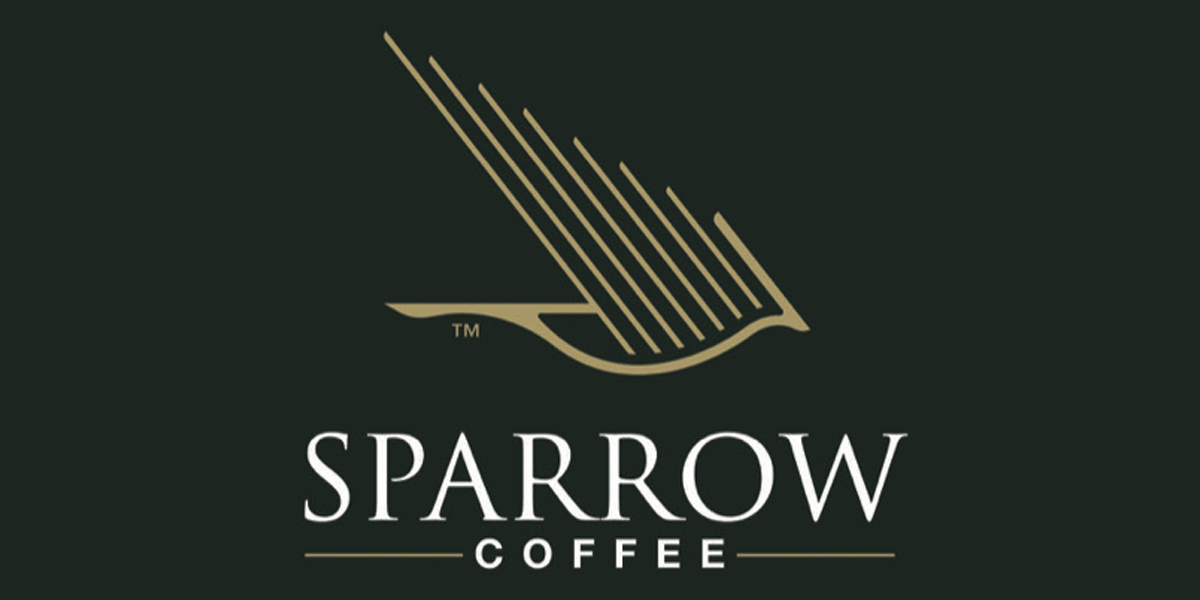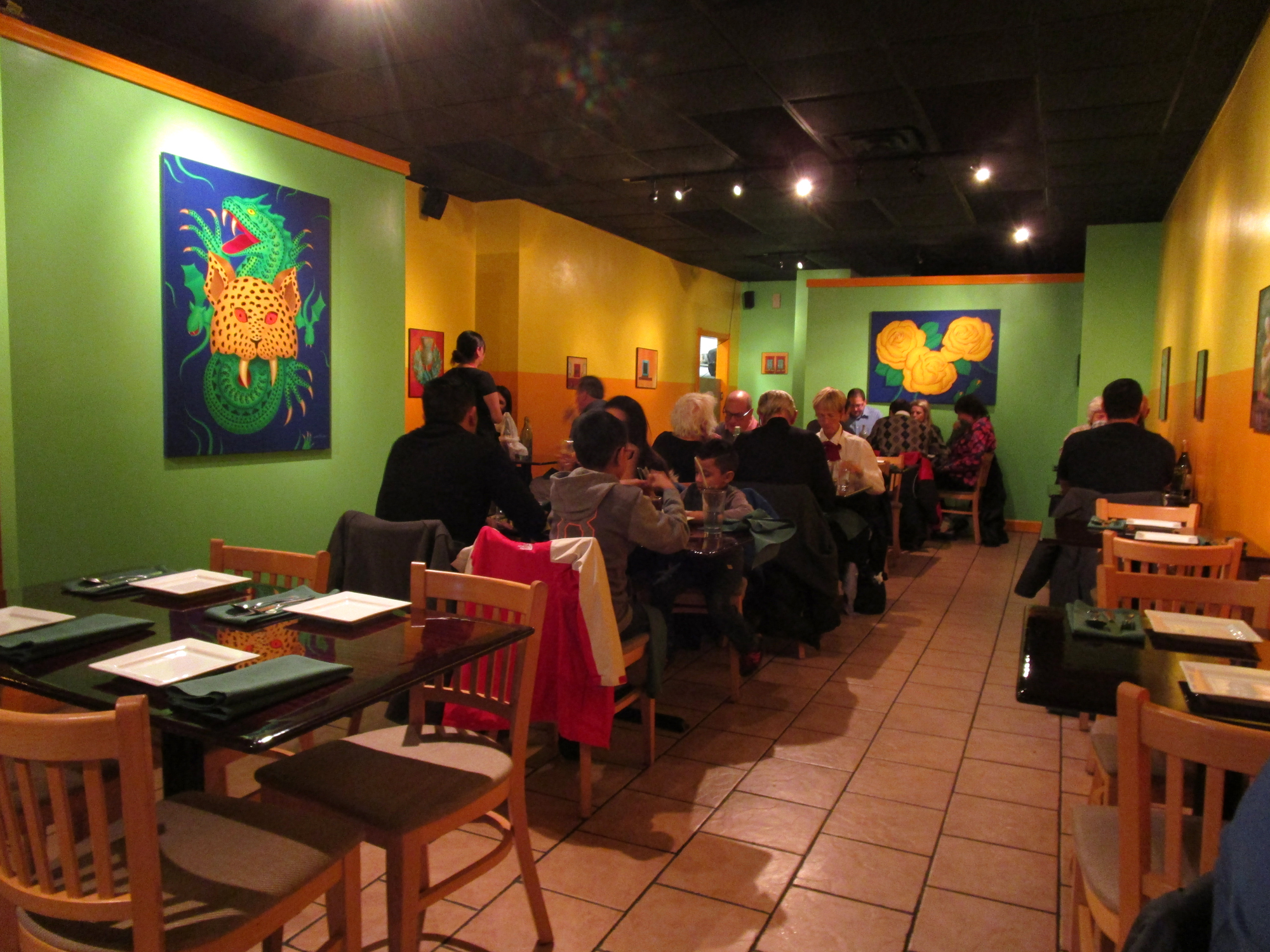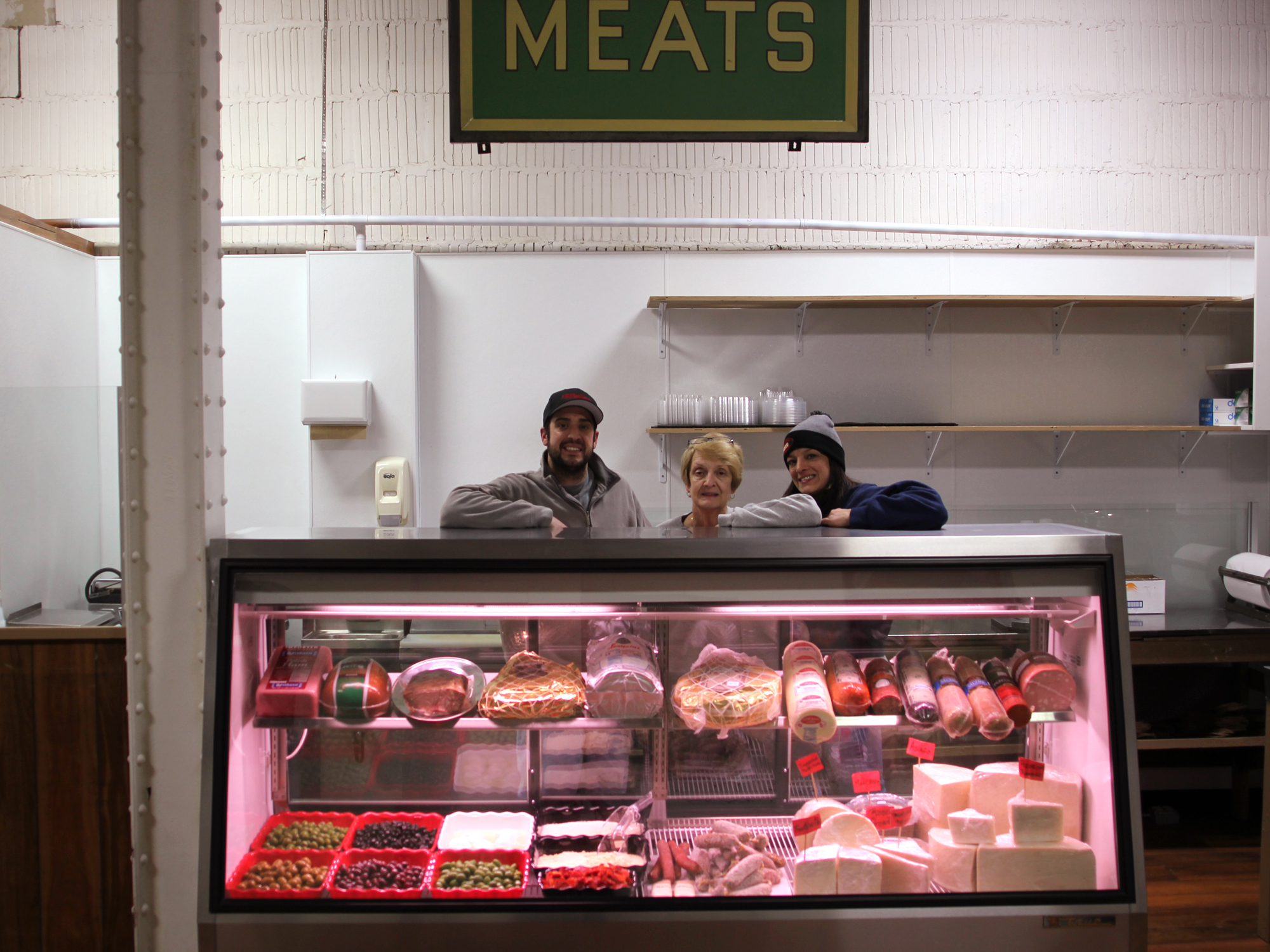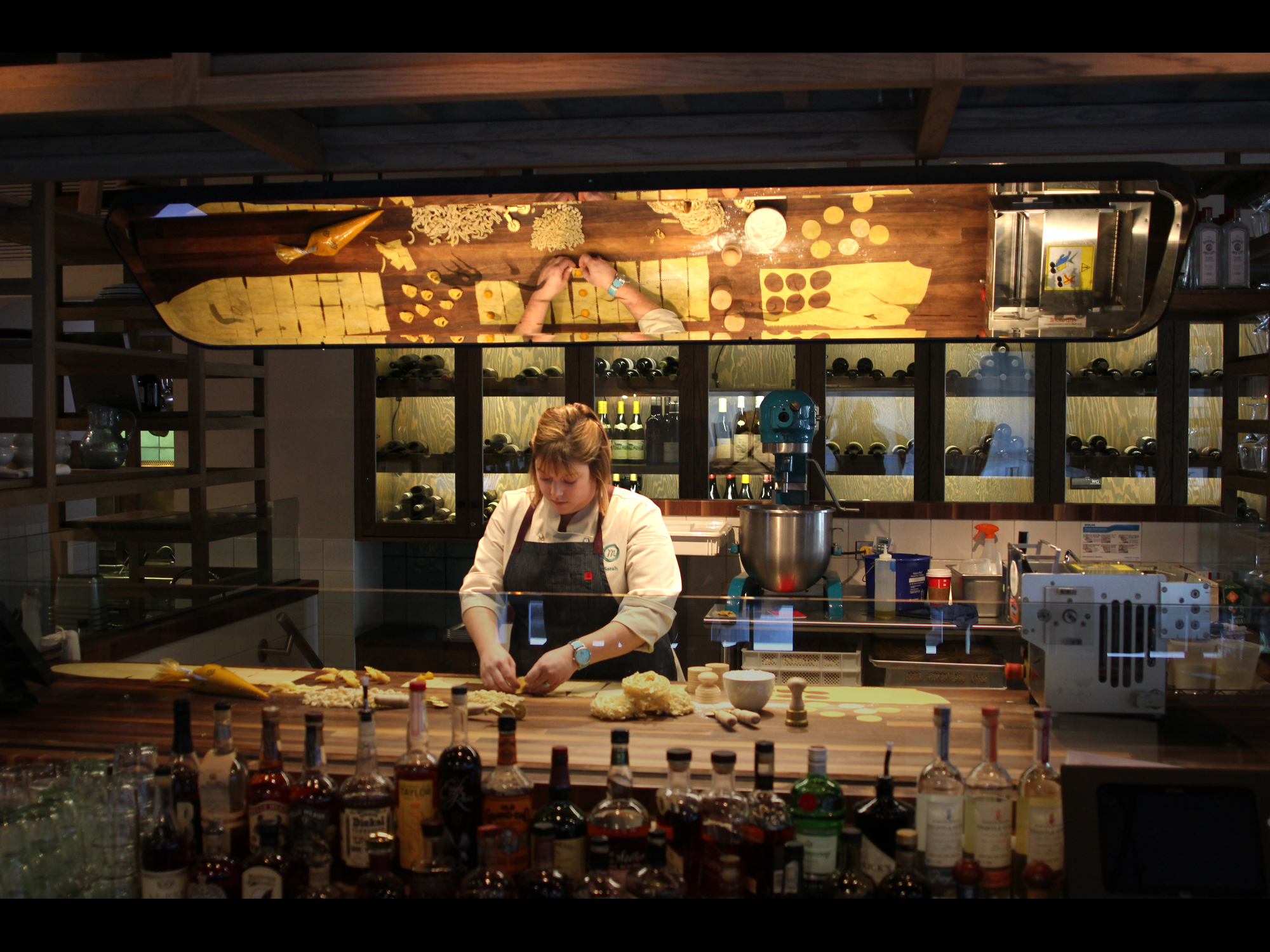TOM VAN LENTE WORKS AT A PLACE THAT serves brunch to 60 people at a time. He also co-owns a place that serves it to 7000 people on Mother’s Day.
Van Lente’s grandfather, Tony DeSantis, was a legendary name in Chicago entertainment, longtime owner of a famous south side nightclub called The Martinique and, later, the Drury Lane chain of live theaters, which stretched over the years from Water Tower to Lincolnshire and its present home in Oakbrook.
In 2007, DeSantis died at age 92— and two months later Van Lente’s mother died of cancer. She was the last of her generation, and the result was that Van Lente, his brother and his three cousins, all in their 20s, found themselves the owner-operators of a massive dinner theater complex that packs suburbanites in for Equity productions of musicals like Les Miserables and The 25th Annual Putnam County Spelling Bee.
Meanwhile, he was a kid working in the kitchen at the Boka Group’s Landmark in Lincoln Park. That was a choice he made early on, helping out in the family business—”When you turned eight, you got a job there,” he says. “High school, summers, I would be in the kitchen or the box office. And sitting in a box office in the suburbs in the mid-90s was like sitting in a cloud of smoke and gossip with a bunch of middle-aged women. I was like, I’m out of here, Grandpa, I’m going to go work in the kitchen.”
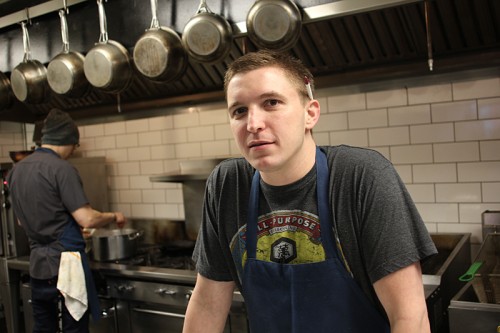
Tom Van Lente
“I worked pasta station for the Thursday matinees, all day Wednesdays we’d start prepping for Sunday brunch, and that’s how you just kind of learned how things went. You’re slicing bread and peeling carrots by the thousands,” he says. “I wanted to be in a kitchen from an early age. From the massive amounts of people in a kitchen like Drury Lane’s, you really see how leadership is a necessity. How management is everything in terms of giving people something to do for their shift, keeping everybody busy in a place like that. When you walk in a place like that, so green, everybody’s got their job to do, you say—I could fit into how this works. I think that really hit home, and I thought, I want to be a part of this culture.”
“Sitting in a box office in the suburbs in the mid-90s was like sitting in a cloud of smoke and gossip. I was like, I’m out of here, Grandpa, I’m going to go work in the kitchen.”
By now I’ve gotten that this is not going to be the story of a crazy-ass chef who fell into cooking from a decadent rock and roll lifestyle. “I went to DePaul because I knew how important it was going to be, in the big picture,” he says. “I knew I wanted to eventually take over that massive kitchen. I knew I wanted to have an education in a separate platform that I could fall back on, and—kind of be smart about it.” At the same time, he wasn’t entirely the servant of family destiny—”It took me five years, because I was having so much fun at DePaul. How could you not?”
His original plan after DePaul was to go to the California Culinary Academy, but by then his mother’s cancer had gone into remission “for the second or third time” and he decided to stay in Chicago, attending Kendall. Consciously choosing to make his career outside of Drury Lane, he got his first job at Landmark, and went from there to the Four Corners group. But when the owners of a restaurant in Elmhurst called Zak’s Place, whom he had known for some years in the suburban dining community, started planning to brave the city’s dining scene with a West Town spot called Two in 2012, he signed on with them for his first executive chef position. “I was a lot more affordable than anybody else they could have picked,” he offers as an explanation. He spent two and a half years there, meanwhile raising his visibility by cooking widely at events with other chefs.
His next move was the kind of thing that would make anybody’s name—he joined Big Star, the One Off Hospitality taco and beer Disneyland, in February of last year. The only thing more likely to make food news than joining Big Star would be leaving it, which he did eight months later. Van Lente is carefully politic in explaining why: “One Off is such an amazing company—even if I wanted to say something bad about them, I couldn’t. From top to bottom, great people, great company. My exact position was just too corporate.”
He says that in going to Big Star, “I made the conscious decision to go out of my comfort zone. Earlier I had interviewed with Rick Gresh about the Virgin Hotel. And we just laughed at each other—he said, you can’t do this job, you don’t have any big [operation] experience. Drury Lane doesn’t count. And that just got me thinking. Cary Taylor got my foot in the door, and day to day, it was a wildly cool experience but I missed the cooking side of it. But I can say now, I can run anything,” he says.
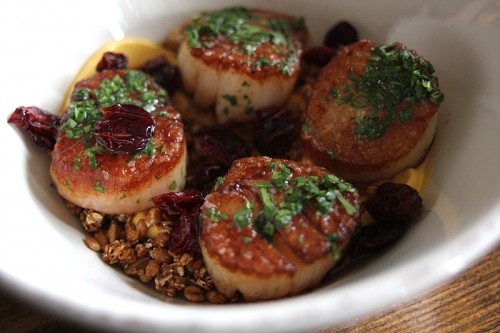
Scallops, sweet potato puree and puffed farro, housemade granola
JOHN AND LYNN MANILOW HAVE HAD THE SPACE at Webster and Racine for more than 20 years, and for most of that time it was John’s Place, eventually spawning a spinoff in Roscoe Village. In 2014 they turned the Lincoln Park John’s Place into a more upscale farm-to-table restaurant called White Oak Tavern & Inn, which attracted a lot of praise under chef John Asbaty, a veteran of Alinea and the well-liked South Loop Italian deli/restaurant Panozzo’s. But then Asbaty, whose wife had recently had a baby, left, and the restaurant quickly lost its focus and was written off by followers of the dining scene.
John Manilow is someone with his own family connections—his father, Lewis Manilow, is a prominent developer and art collector who helped found the Museum of Contemporary Art, and his brother David is the producer of Check, Please. So there must have been some high-level Chicago power-broker action to connect the Manilows and the proprietors of Drury Lane, right? “I answered a Craig’s List ad,” Van Lente says. “Upscale restaurant in Lincoln Park, they used all the buzzwords. So I sent them my resume.”
Six weeks since he started, he recognizes the challenge of having to publicly turn a place around in real time. “Walking into something that needs to get fixed, you have to find out what’s broken,” he says. “You can’t shoot yourself in the foot every day because the doors open at five. So I can’t bring in all this product and then flip the menu. I don’t know if the servers could handle a menu flip in two days. We’re still evaluating talent, because hypothetically, if I wanted to get rid of three people, we’d have to find three people, or else it’s Jeremy [Loya, his sous chef] and me banging out 175 covers on Saturday night. We’d want to kill each other—and then not want to come back for brunch.”
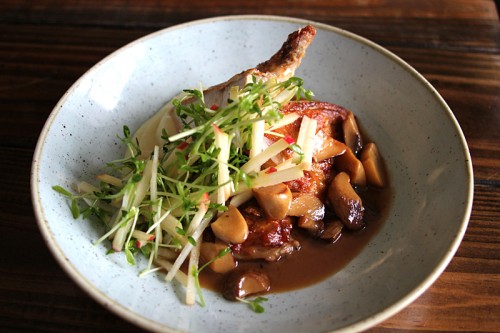
Slagel chicken, wild mushrooms, apple slaw
Asbaty’s approach had stressed White Oak as a farm to table restaurant with name farms on the menu—sometimes pushing it pretty far out of Lincoln Park’s comfort range, as with his Farm Dinners built around things like rabbit. Van Lente (who came in months after Asbaty left) isn’t exactly backtracking from that—when I ask him about the chicken I’m offered to taste (and photograph), he answers that it’s from Slagel, a Chicago food Very Important Chicken. But he’s also bluntly realistic about doing so within a framework of not going broke for your principles. “First day here, I opened the double door reach-in and found $1500 of 1871 Dairy. There’s a short shelf life on that stuff,” he says, eyes rolling a little. “We’re obviously trying to source responsibly, while still trying to run a proper business. Personally, I think the farm to table label is kind of bastardized. But comfort, American comfort tavern food, is bullseye what we’re aiming for.”
And he at least hopes to raise the level of dining in Lincoln Park, a wealthy neighborhood that has rarely been an exciting dining one, apart from the one-two punch of Alinea and Boka on Halsted. “We’re five blocks from The Bristol on Webster. Just because we’re east of Western doesn’t mean we don’t exist,” he says. “When people think of Lincoln Park, I want them to think of White Oak Tavern and think of kickass amazing food, it’s approachable, it’s price conscious, it’s killer service and a phenomenal bar program. I think this area in general needs all of that.”
That’s his goal, and if I see a little contradiction in it—he wants to be approachable for the comfortable of Lincoln Park and daring enough to attract people who’d go to The Bristol at the same time—it’s the right challenge for someone whose destiny is ultimately to raise the level of what gets served to people about to see Cats. A destiny, it turns out, that was not the intention of his grandfather, Tony DeSantis.
“Our grandfather, growing up—tiny Italian guy, you’d think he was angry all the time but it was just a façade so people took him seriously,” Van Lente says. “He beat into all of us, ‘I’m working this hard so you guys will never have to be in this business.’ And now my brother owns a restaurant in Westmont, I’m here, and two of my cousins are president and CFO of the company. We listened to him for a while, I guess.”
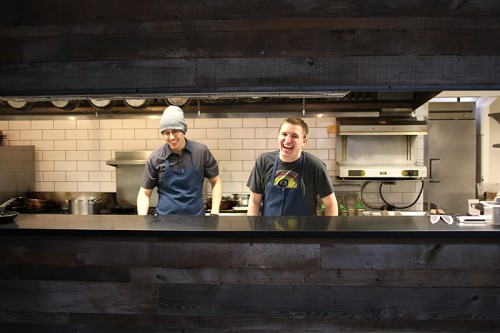
Van Lente and sous chef Jeremy Loya
Michael Gebert tries to be more Sky Masterson than Inspector Javert as editor of Fooditor.
Latest
Join the Discussion
After you comment, click Post. If you're not already logged in you will be asked to log in or register with Disqus.



